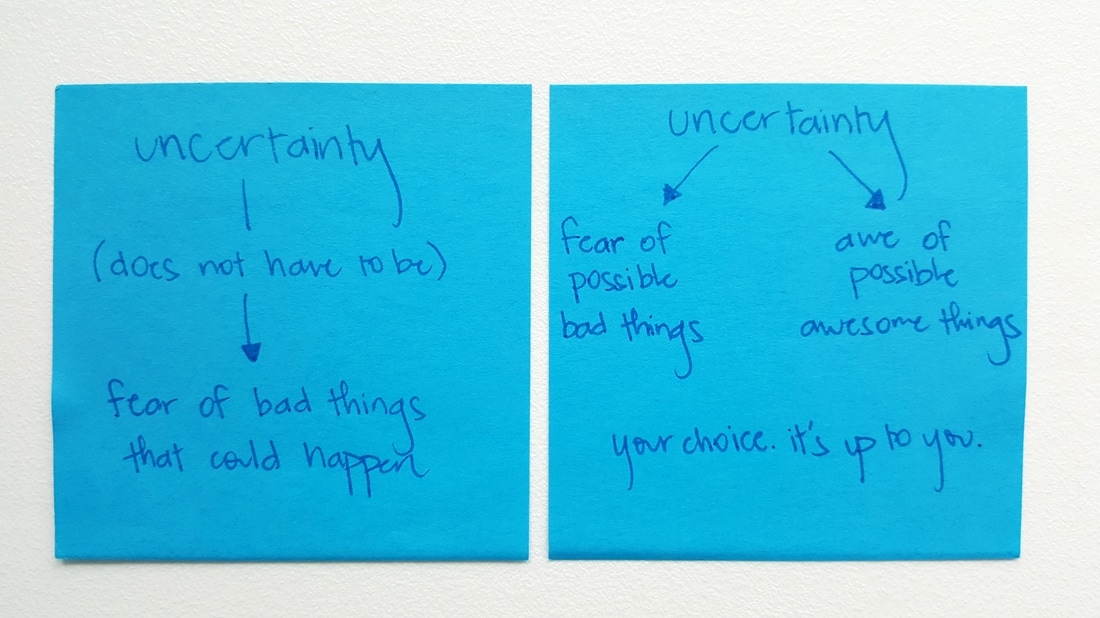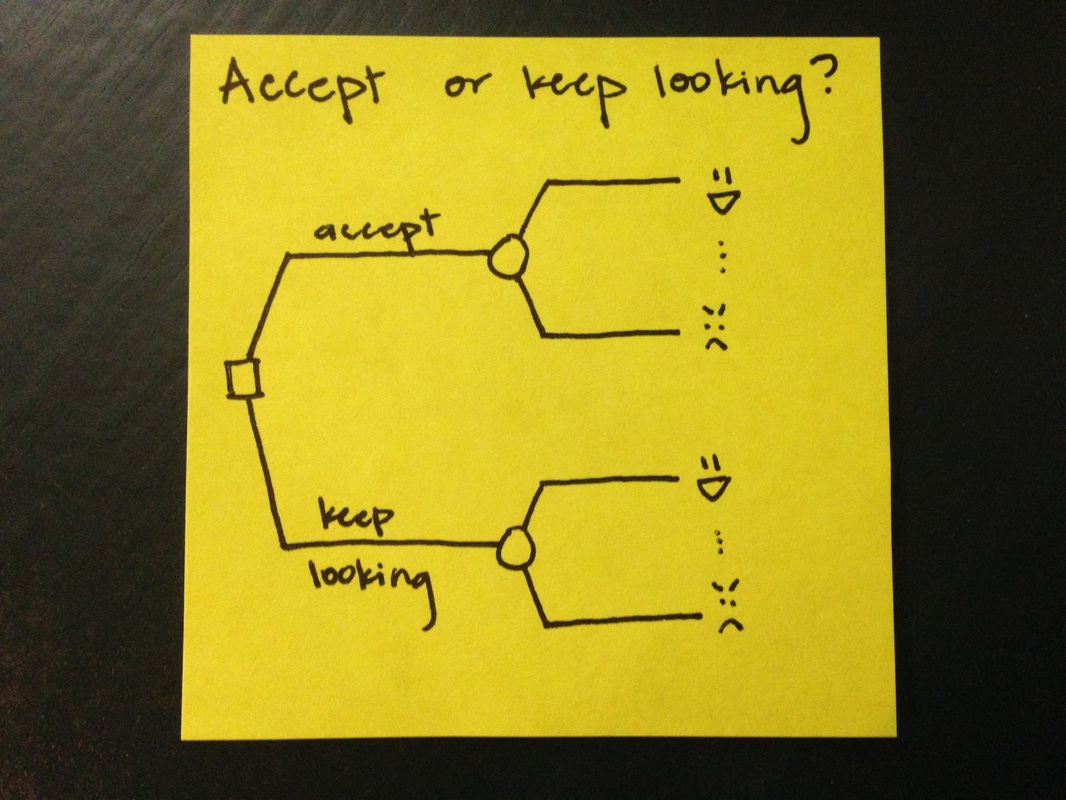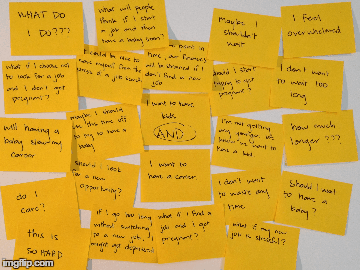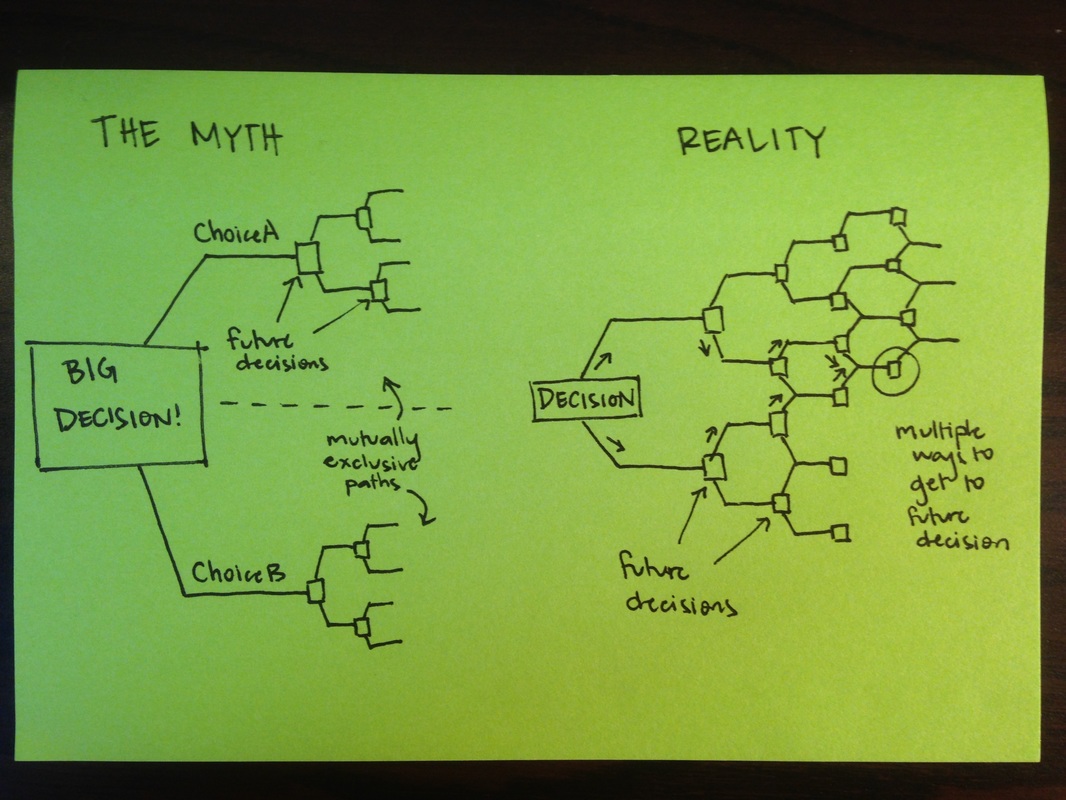|
Have you ever decided not to do something because you were afraid of what might happen? This is a pretty common sentiment I've seen among those I coach. One of the things that makes decision-making tricky is the presence of uncertainty.
However, uncertainty is not the same as risk. It's actually risk, not uncertainty, that most people fear. Risk is a probability or threat of damage, injury, liability, or loss. Uncertainty is simply when the consequences of an action cannot be predicted. Decisions are far less scary when you recognize uncertainty is not the same as risk. You do not have to tie uncertainty to the fear of the possible bad things that could happen. You can focus on the wonder of possible awesome things that could happen. It's your choice.
0 Comments
It’s a common decision that a number of my clients face. They have an offer, which is comforting, but they have some concerns. At the same time, they are nervous about the uncertainty of where a continued search may lead. So what do you do? Accept the offer or keep looking? Again, it’s the uncertainty that makes the decision difficult. But here are a handful of questions you can ask yourself to clarify your thinking.
“I just don’t know how this will pan out.”
A few months back, Maria left her marketing job at a large company in order to spend more time with her young daughter and do more interesting work. She had put a lot of thought into that decision, and was happy with it. Now, her day-to-day work with a start-up was far more intellectually stimulating than her previous job. However, the uncertainty of whether the early stage start-up would succeed nagged at her. “Do I keep working for an unfunded start-up, or do I look for a salaried position at a funded start-up?” Over the course of my Decision Analysis Session with Maria, we unpacked the decision she faced until she had a clearer picture of how to proceed. I never realized just how much anxiety was triggered by decision making until I began sharing with people that I studied decision engineering at Stanford. “That’s neat! I hate decisions. Can you help me?” “That’s a thing? Why don’t they teach that to everyone? I could totally use that.” “Wow. Can I just outsource all my decision making to you?” I absolutely love the process of untangling decisions. Most people don’t. They run the other way. And when they do face one, it can feel confusing, emotional, stressful, and overwhelming. But it doesn’t have to be that way. One of the best things you can do to avoid thinking in circles is to get all of those thoughts about the decision out of your head and onto paper, into a decision tree. A decision tree is a visual representation of the decision(s) you have to make, the uncertainties in play, and the possible outcomes you may face. Once your thoughts are mapped out outside of your head, it becomes easier to evaluate what course of action makes sense.
Let’s take, for example a common dilemma faced by a number of professional women. “Michelle, I need your help.”
“Sure, what’s up?” “I need to decide what to do with my career.” “Ok, what is it about your career you’re deciding on?” “The rest of it!” From college seniors about to graduate, to MBAs with 20 years of working experience, countless people have come to me completely stressed out about career decisions. When I dig deeper into what keeps them in a state of paralysis, unable to move forward, it’s often because they’ve fallen victim to the biggest career myth of all time: that figuring out what you want to do with your career is a single, one-and-done decision. But deciding what you want to do next in your career is not an irrevocable, “Final Answer!” type of decision. Careers (and life, for that matter), are the sum of a number of smaller decisions that happen over time. My clients are pretty amazing people. They are consultants whose recommendations are sought by Fortune 500 companies. Entrepreneurs who had built their own business before deciding to move on to something new. Experienced professionals who have emerged as leaders in their field. They are extremely bright, often alums of the top schools in the world. They set a high bar for their own performance. They often have perfectionist tendencies, which helped them achieve the success they’ve achieved to date. They are driven and ambitious.
But there’s something else that they all seem to have in common. Something that really surprised me. Every single one who sought out my coaching at a crossroads in their career, carried a great deal of shame, guilt, or both. What were they ashamed of? The stories were similar. Scott described himself as someone who had always had a plan, but this was the first time he wasn’t sure what to do. Corrine graduated at the top of her class, but five years later, her career felt stalled while others’ were soaring. Rebecca had poured all of her energy during business school to land her “dream” job, which now felt like a nightmare. They felt ashamed of not knowing what they wanted, of not keeping pace with their peers, of having made a mistake. They no longer trusted their ability to make good decisions or perform at the level they were accustomed to. And then there was the guilt. Scott earned a six-figure salary and worked for a well-known company. He “should have been happy.” “Countless others would love to have my job. Why can’t I just be happy?” But he wasn’t, and felt guilty about that. He wasn’t the only one. I’ve consulted many people who had “made it.” They had cushy salaries, a nice cars, designer bags, apartments in a sought-after neighborhoods. But something was keeping them from enjoying it all. And they felt bad about that. What I found was that it’s near impossible to make any progress toward the next step in your career until you can shed the feelings of guilt or shame that are weighing you down. When you doubt your own abilities, it’s impossible to authentically sell your strengths in an interview. When you feel you don’t deserve more than you already have, it’s impossible to seek out what’s missing. So, what can you do? My neighbor: I was unhappy, unhealthy, and fat. But I still didn’t leave. I couldn’t.
My neighbor was telling me how she finally decided to take a sabbatical from her job. My neighbor: I knew things were bad. Really bad. I was working crazy hours, I was stressed out all the time, I barely saw my partner or my kids, and when I did, I wasn’t really there with them. The stress of my job would follow me home. I dreamed of leaving my job, but I didn’t. How could I? I was C-level exec at a major pharmaceutical company. It wasn’t until my doctor told me that my job was slowly killing me, like literally, my health was at stake, that I decided I had to do something different. Let’s be honest. Two years ago, after I graduated without a job, I had days when I freaked out. Last winter, months after my friend also graduated without a job, she freaked out. A few months ago, when my boyfriend realized that his under-employment was not sustainable, he freaked out.
We’re all bound to go through it: the “I need a job!” freakout. It’s ok. Freaking out can be legitimate. We all have bills to pay in order to maintain life’s necessities, like food and shelter. Freaking out can also be therapeutic. If you’re around a bunch of other people who don’t have jobs, it’s something you can commiserate about. Aaaah freakout! Le freak, c’est chic. But there’s a point where all that freaking out isn’t healthy. And I doubt it’s making you happy. Take time to find out what you want. Make time for the things you love.
What happens now will not determine the rest of your life. Those were the three pieces of advice I gave during my presentation to a group of undergrads last week. And then I opened it up to Q&A. “What if I kinda know what I want to do, but I don’t think I can get there right after I graduate?” Excellent question. I did a lot of talking about how important it is to figure out what you want, and told a story about how I finally got it. It’s only natural to think that I am encouraging folks to go out and get their dream life. I am. It’s risky. It can be scary. And for an undergrad who is still building up his savings, resume, network, and life experience, it can be difficult to get to exactly where you want. In an economy like this, it may mean just taking “a” job. The important thing to remember is to keep moving forward somehow and guard yourself against getting stuck. 4 Steps to Staying on Course |
Archives
May 2017
Categories |




 RSS Feed
RSS Feed
